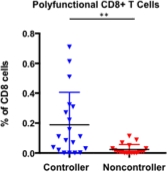BK Virus-Specific Polyfunctional CD8+ T Cells Predicts Successful Control of BK Viremia After Kidney Transplantation
1Medicine/Infectious Diseases, David Geffen School of Medicine (DGSOM) at UCLA, Los Angeles, CA
2UCLA Immunogenetics Center, DGSOM at UCLA, Los Angeles, CA
3Medicine/Nephrology, DGSOM at UCLA, Los Angeles, CA
4Urology, DGSOM at UCLA, Los Angeles, CA.
Meeting: 2015 American Transplant Congress
Abstract number: B239
Keywords: Infection, Non-invasive diagnosis, Polyma virus, T cells
Session Information
Session Name: Poster Session B: Translational Genetics and Proteomics in Transplantation
Session Type: Poster Session
Date: Sunday, May 3, 2015
Session Time: 5:30pm-6:30pm
 Presentation Time: 5:30pm-6:30pm
Presentation Time: 5:30pm-6:30pm
Location: Exhibit Hall E
Introduction: BK Virus associated nephropathy (BKN) remains an important cause of graft loss after kidney transplantation. We hypothesized that analysis of the anti-BK virus immune response would provide insight into why some patients are able to control viremia while others experience persistent viremia and progression to BKN.
Methods: 22 kidney transplant recipients with BK viremia detected by PCR screening were included. Peripheral blood mononuclear cells were isolated and analyzed by flow cytometry after stimulation with peptide pools representing all expressed BK virus proteins. Patients with <3 months of BK viremia were designated “controllers”, while those with >3 months of BK viremia were designated “noncontrollers”. All samples collected during viremia were analyzed.
Results: All patients were treated with reduction in immunosuppression. Compared with noncontrollers, controllers demonstrated a statistically significant increase in frequency of BK virus-specific CD8+ T cells expressing multiple inflammatory cytokines (IFN-γ, TNF-α, IL-2) (0.11% versus 0.01%, p=0.001) (See Figure, controllers in blue, noncontrollers in red, asterisks indicate statistical significance). This difference was not observed for CD4+ T cells. Increase in frequency of CD8+ cells expressing multiple cytokines (polyfunctional T cells) was detectable at the start of BK viremia. 71.2% of BK virus-specific polyfunctional T cells expressed the T cell activation marker CD107a.
This difference was not observed for CD4+ T cells. Increase in frequency of CD8+ cells expressing multiple cytokines (polyfunctional T cells) was detectable at the start of BK viremia. 71.2% of BK virus-specific polyfunctional T cells expressed the T cell activation marker CD107a.
Conclusion: These findings suggest that increased frequency of BK virus-specific polyfunctional CD8+ cells is the mechanism by which controllers effectively limit BK virus replication. This approach represents a novel method for noninvasive monitoring to predict persistence of viremia, permitting customization of immunosuppression.
To cite this abstract in AMA style:
Schaenman J, Korin Y, Sidwell T, Kandarian F, Harre N, Pham P-T, Bunnapradist S, Danovitch G, Veale J, Gritsch H, Reed E. BK Virus-Specific Polyfunctional CD8+ T Cells Predicts Successful Control of BK Viremia After Kidney Transplantation [abstract]. Am J Transplant. 2015; 15 (suppl 3). https://atcmeetingabstracts.com/abstract/bk-virus-specific-polyfunctional-cd8-t-cells-predicts-successful-control-of-bk-viremia-after-kidney-transplantation/. Accessed February 22, 2026.« Back to 2015 American Transplant Congress
